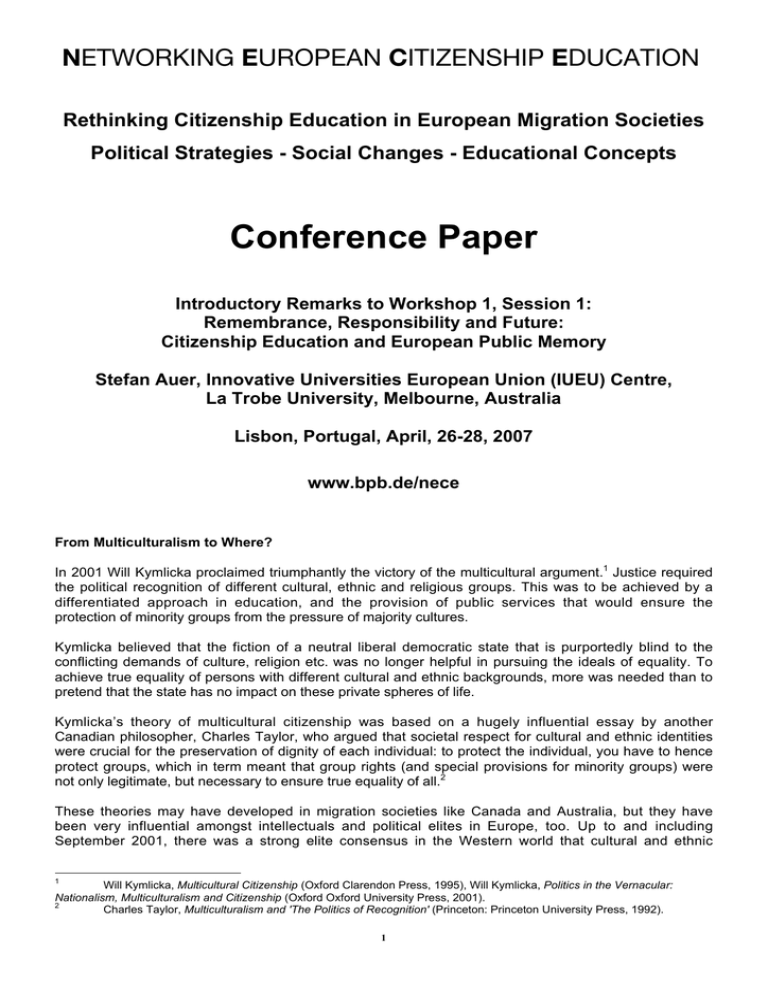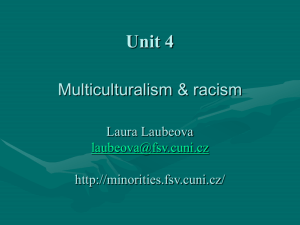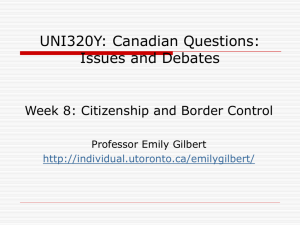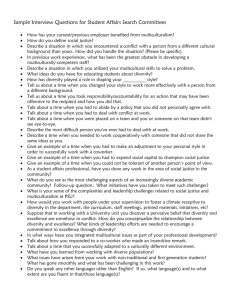N
advertisement

NETWORKING EUROPEAN CITIZENSHIP EDUCATION Rethinking Citizenship Education in European Migration Societies Political Strategies - Social Changes - Educational Concepts Conference Paper Introductory Remarks to Workshop 1, Session 1: Remembrance, Responsibility and Future: Citizenship Education and European Public Memory Stefan Auer, Innovative Universities European Union (IUEU) Centre, La Trobe University, Melbourne, Australia Lisbon, Portugal, April, 26-28, 2007 www.bpb.de/nece From Multiculturalism to Where? In 2001 Will Kymlicka proclaimed triumphantly the victory of the multicultural argument.1 Justice required the political recognition of different cultural, ethnic and religious groups. This was to be achieved by a differentiated approach in education, and the provision of public services that would ensure the protection of minority groups from the pressure of majority cultures. Kymlicka believed that the fiction of a neutral liberal democratic state that is purportedly blind to the conflicting demands of culture, religion etc. was no longer helpful in pursuing the ideals of equality. To achieve true equality of persons with different cultural and ethnic backgrounds, more was needed than to pretend that the state has no impact on these private spheres of life. Kymlicka’s theory of multicultural citizenship was based on a hugely influential essay by another Canadian philosopher, Charles Taylor, who argued that societal respect for cultural and ethnic identities were crucial for the preservation of dignity of each individual: to protect the individual, you have to hence protect groups, which in term meant that group rights (and special provisions for minority groups) were not only legitimate, but necessary to ensure true equality of all.2 These theories may have developed in migration societies like Canada and Australia, but they have been very influential amongst intellectuals and political elites in Europe, too. Up to and including September 2001, there was a strong elite consensus in the Western world that cultural and ethnic 1 Will Kymlicka, Multicultural Citizenship (Oxford Clarendon Press, 1995), Will Kymlicka, Politics in the Vernacular: Nationalism, Multiculturalism and Citizenship (Oxford Oxford University Press, 2001). 2 Charles Taylor, Multiculturalism and 'The Politics of Recognition' (Princeton: Princeton University Press, 1992). 1 NETWORKING EUROPEAN CITIZENSHIP EDUCATION diversity of modern societies was to be cherished: We were all multiculturalists then! A notable exception was Brian Barry who mounted a scathing attack on the growing literature on multiculturalism. In his comprehensive study, Culture and Equality, he argued that an excessive focus on culture and religion came at the expense of the demands for social justice. Against the thenpopular focus on the ‘politics of recognition’, Barry defended a more traditional liberal approach. He argued that the normative goal of ethno-cultural neutrality of a liberal democratic state was still very useful. Though it could not eliminate all conflicts and satisfy all conflicting demands for special treatment voiced by different cultural, ethnic and religious groups, it managed to minimize all violent conflicts. Barry reminded his readers that the ideal of liberalism emerged in Europe after the devastating experiences with religious wars. 3 These days, more and more people are asking, how much multiculturalism can we have? This was not considered a problem as long as the groups to be accommodated were truly marginal (i.e. Amish in the US), but where the mix was from the outset much more heterogeneous, the challenge seemed more real. Hence, the intellectual architects of multiculturalism in Australia stressed from the outset that multiculturalism did not imply that all cultural and societal practices were acceptable; there was still need to accept a basic set of overarching (Australian?) values. This was seen as a crucial precondition to the maintenance of social cohesion (which in turn was indispensable in order to sustain popular support for multiculturalism). Leitkultur This resembles German debates about the so-called ‘Leitkultur’ – that is, the arguments that Europe and/or Germany need to strengthen confidence in its own set of cultural and political values. Only then will they be able to accommodate newcomers. At any rate, the strong consensus about the virtues of multiculturalism can no longer be taken for granted. The question arises: How can we strengthen the acceptance of the other and prevent a relapse into primordial hatred? The notion of a European ‘Leitkultur’ was, to my knowledge, introduced to German debates about multiculturalism by a distinguished German scholar (of Muslim background), Bassam Tibi.4 The question is what kind of ‘Leitkultur’, if any, do we need and how can we foster it – at a national and/or at a European level? European identity For many intellectuals in Germany the most plausible proposition is to develop a European identity on a set of political values, rather than a sense of belonging to an ethnically defined nation, with its own particular historical experiences. The best known articulation of this ideal is Habermas’ concept of ‘constitutional patriotism’. For Habermas, Europeans should unite around the common future-oriented project of European unity, which is informed by their common experience of the past full of conflicts and mutual destruction: developments in Europe have been more strongly marked by divisions, differences and tensions than in any other culture… In happier moments, these sharp, often fatal, conflicts have acted … as an impulse toward critical reflection on, and distancing from, prejudices and biases; as a 3 ‘The liberal formula for depoliticalization of differences arose as a way of dealing with the strife between Protestants and Roman Catholics that the Reformation brought about, and that remains an important reference point. The prior assumption in Europe was that civil peace required the imposition of single religion within each state, and that their international peace required the mutual recognition by state of the rule ‘Cuius region, eius religio’: to each realm its own religion. … The liberal move … consisted in throwing all of this in reverse. The source of conflict, it was now suggested, was the very attempt to create religious conformity that was supposed to eliminate conflict. Only if the state took no official line on religion would religious passions be calmed and peace assured. As we now know, the gamble paid off, and religious toleration brought an end to holy warfare.’ Brian M. Barry, Culture and Equality: An Egalitarian Critique of Multiculturalism (Cambridge, Massachusetts: Harvard University Press, 2001) 25. 4 Bassam Tibi, Europa ohne Identität? Leitkultur oder Wertebeliebigkeit, Second ed. (Munich: Siedler, 2001). 2 NETWORKING EUROPEAN CITIZENSHIP EDUCATION motive for the overcoming of particularisms, toward tolerance and institutionalisation of disputes. These experiences … have shaped the normative self-understanding of European modernity into an egalitarian universalism that can ease the transition to postnational democracy’s demanding contexts of mutual recognition for all of us – we, the sons, daughters, and grandchildren of a barbaric nationalism.5 This European identity and self-understanding is based on the premise: ‘never again war, never again the Holocaust’. Yet, there are limitations of this approach. Firstly, the historic experience of European nations is not as uniform as Habermas wants us to believe (consider British and Polish perspectives on nationalism6). Secondly, there is a danger in using the legacy of the Holocaust in a way that is demeaning to its victims and counterproductive politically. Thus, the voters in Netherlands deciding on the Treaty establishing the European constitution were told that the EU protects the nations of Europe from relapse to barbarism that the continent experienced during the Second World War. People in this referendum were effectively told that the choice was between the EU constitution and Auschwitz. Such crude instrumentalization of the Holocaust was bound to backfire politically (as it did in Netherlands). One more problem: How to respond to the challenge of tolerating ethnic and religious groups that are themselves intolerant? It is no secret that the extremist strands of Islam have been openly anti-Semitic. (This was well understood and exploited already by the Nazis who cultivated links with Arabs in the Middle East on the old premise of the ‘Realpolitik’: the enemy of my enemy is my friend).7 If there is such a thing as a European ‘Leitkultur’, one of its defining features is the critical distance from religion. The enlightenment project of questioning the wisdom of tradition and truth based on religious revelation has led to secularization of European societies. Religion has been relegated into the private sphere. Many Christians might find anti-Christian writings offensive, but they have no power, or the will to banish them from the public discourse. (The onslaught on Christianity since the late eighteen century in Europe has been so pervasive that it is not clear where they would have to start anyhow). This is different in contemporary Muslim communities, which have demonstrated much higher sensitivity with respect to their religious symbols. Think of the Danish cartoons controversy. What was very unsettling was one of the responses to this controversy: The publication of a cartoon of Hitler in bed with Anna Frank. This rhetorical gesture was as reprehensible as it was clever. It identified one of the last remaining taboos in Europe (or the liberal democratic West in general), which – if only negatively – has defined postwar Europe. Never again Auschwitz! Is this enough for Europe in the 21st century?8 5 Jürgen Habermas, Postnational Constellation (Cambridge, Massachusetts: MIT Press, 2001) 103. Marek A. Cichocki, Porwanie Europy (Krakow, Warsaw: Ksiegarnia Akademicka, 2004). 7 Matthias Küntzel, "From Zeesen to Beirut: National Socialism and Islamic Anti-Semitism " Telos, no. 129 (2004). 8 Tony Judt, the author of one of the most fascinating accounts of European history after the Second World War, believes strongly that this is not enough. Tony Judt, Postwar: A History of Europe since 1945 (London: William Heinemann 2005). 6 3 NETWORKING EUROPEAN CITIZENSHIP EDUCATION Bibliography Barry, Brian M. Culture and Equality: An Egalitarian Critique of Multiculturalism. Cambridge, Massachusetts: Harvard University Press, 2001. Cichocki, Marek A. Porwanie Europy. Krakow, Warsaw: Ksiegarnia Akademicka, 2004. Habermas, Jürgen. Postnational Constellation. Cambridge, Massachusetts: MIT Press, 2001. Judt, Tony. Postwar: A History of Europe since 1945 London: William Heinemann 2005. Küntzel, Matthias. "From Zeesen to Beirut: National Socialism and Islamic Anti-Semitism " Telos, no. 129 (2004): 55-74. Kymlicka, Will. Multicultural Citizenship. Oxford Clarendon Press, 1995. ———. Politics in the Vernacular: Nationalism, Multiculturalism and Citizenship. Oxford Oxford University Press, 2001. Taylor, Charles. Multiculturalism and 'the Politics of Recognition' Princeton: Princeton University Press, 1992. Tibi, Bassam. Europa Ohne Identität? Leitkultur Oder Wertebeliebigkeit. Second ed. Munich: Siedler, 2001. 4


